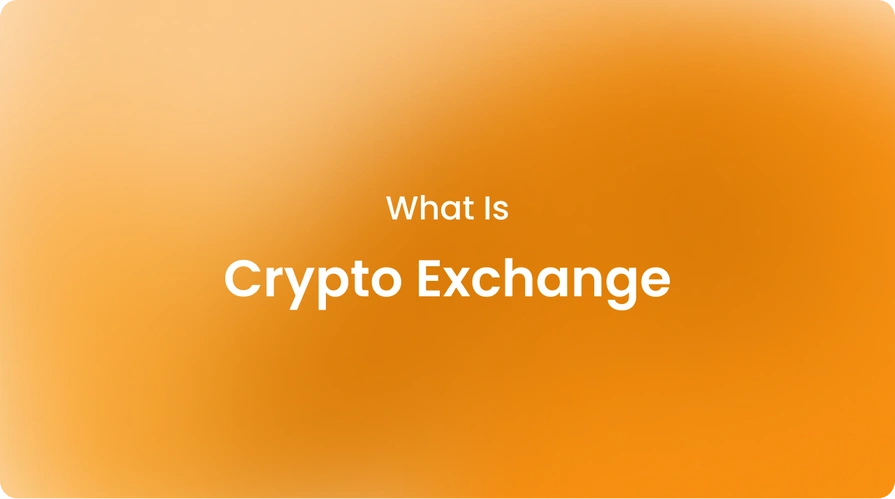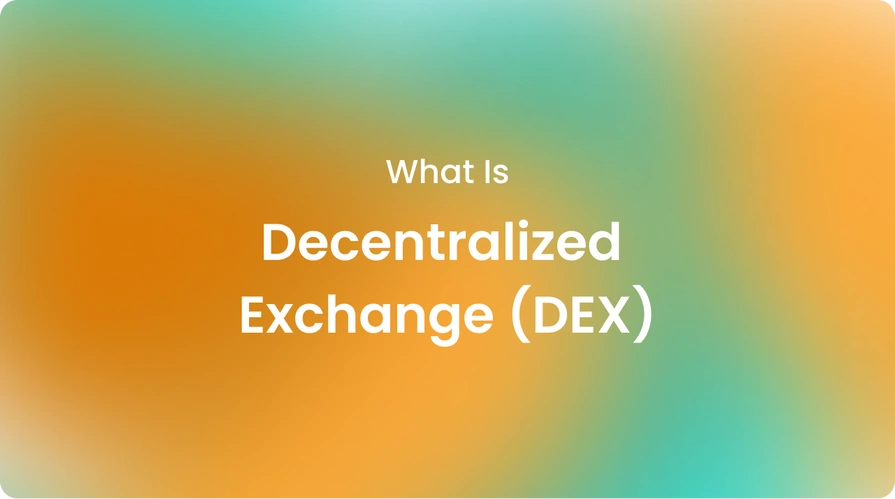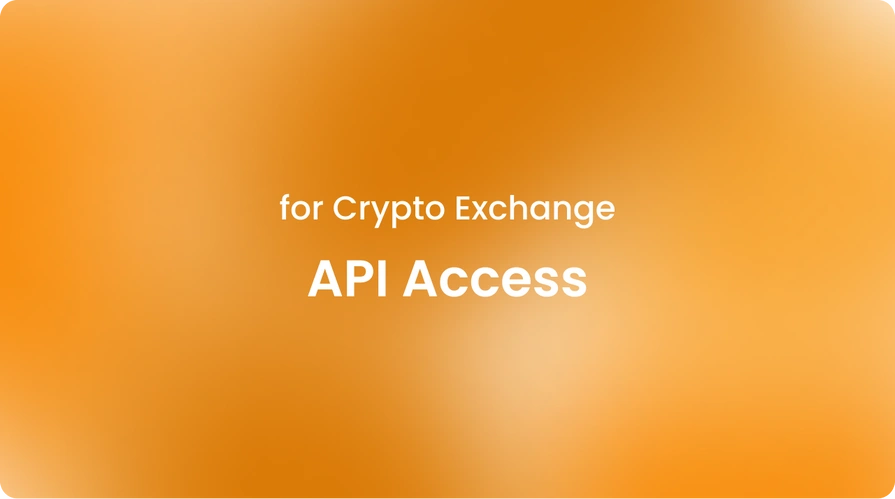|crypto, knowledgehub
What Is a Crypto Exchange?

Cryptocurrency has grown exponentially in recent years, with thousands of different cryptocurrencies entering the market through crypto exchanges. As exciting as it is to invest and trade in digital currencies, doing so requires using specialized platforms called cryptocurrency exchanges.
In this article, we'll explore what crypto exchanges are, how they work, and provide some tips to help you choose the right one for your needs.
Put simply, a cryptocurrency exchange is a digital marketplace where crypto traders can buy and sell cryptocurrencies for fiat currencies like USD or EUR, or exchange between different cryptos.
They act as intermediaries, allowing peer-to-peer transactions through a common network. Without exchanges, it would be near impossible for average traders to buy cryptocurrency from miners or other early adopters.
As mentioned earlier, crypto exchanges allow buying and selling between fiat currencies and cryptocurrencies. Some only support certain countries' currencies.
The largest exchanges tend to support crypto trading between the top cryptocurrencies. Some smaller exchanges may only support a handful of coins.
What does a crypto exchange do?
In more detail, a cryptocurrency exchange performs several key functions:
Provides trading interfaces
Crypto trading platforms to place buy/sell orders and view live market data. Most have mobile apps too.
Facilitates fund transfers
Allows depositing fiat money via bank transfer or debit/credit card and withdrawing profits back to fiat accounts.
Stores digital currency wallets
Crypto exchanges act as custodians for users, maintaining on-platform crypto wallets to hold funds until they are ready to trade crypto.
Matches peers for transactions
The exchange matches buy-sell orders and facilitates transactions between counterparties in real-time.
Audits transactions
Exchanges securely record all trades in distributed blockchain public ledgers for transparency and to prevent double-spending of funds.
What are the requirements for a crypto exchange?
To operate legally and protect users, all reputable crypto exchanges must meet strict regulatory obligations. This usually involves following know-your-customer (KYC) and anti-money laundering (AML) policies.
KYC means verifying user identities, while AML aims to prevent criminal activities like tax evasion, fraud, and terrorism financing. Exchanges must also securely store funds using cryptocurrency wallets, often in “cold storage” offline for enhanced protection.
High transaction volumes require advanced infrastructure to ensure uninterrupted operations. Finally, trading engines need tight integration between the order book, risk management, and types of crypto wallet systems.
How do crypto exchanges work?
Now let's look under the hood to see how crypto exchanges actually work:
- Users sign up and complete KYC verification.
- When funding an account, users deposit fiat and exchange it for crypto wallet balances.
- The order book records all open buy/sell orders from users matched by price or volume.
- Matching engines instantly fulfill matching orders, crediting or debiting trader balances.
- Distributed ledgers record trade data and wallet transactions with cryptography.
- Withdrawals allow reclaiming fiat by selling crypto back into supported currencies.
- Exchanges also offer lending and borrowing of funds and crypto derivative trading.
- Exchanges bring together crypto traders, facilitate transactions, and maintain regulated infrastructures for financial activities involving cryptocurrencies.
What are the three main types of crypto exchanges?
There are three main categories of cryptocurrency exchanges:
Centralized exchanges
These are traditional exchange platforms, which act as intermediaries and hold user funds centrally in the exchange’s wallets.
Decentralized exchanges
Known as DEXs, these have no central authority and allow peer-to-peer trading of crypto directly from users’ personal wallets.
Hybrid exchanges
A mix of centralized and decentralized, these have an on-platform interface while also allowing direct trade execution like on DEXs.
Each type of crypto exchange has pros and cons around security, fees, features, and control of private keys. Most traders start with centralized exchanges due to their ease of use.
How many crypto exchanges are there?
With cryptocurrency gaining unprecedented popularity worldwide, the number of crypto trading platforms has exploded over the past five years. According to Statista, there were over 200 major crypto exchanges in existence as of March 2022.
A select group of leading exchanges consolidates the vast majority of overall crypto trading volume. CoinMarketCap, the primary online cryptocurrency price and market data provider, currently tracks exchange volumes across over 300 platforms.
Most crypto trading activity concentrates on just a few mega exchanges that lead the market in terms of liquidity, coin selection, and ease of use.
Things to check before selecting a crypto exchange
When selecting a crypto exchange, it's important to consider requirements like available crypto coins, fees, and regulations to identify the best crypto exchange suited for your needs.
With so many options now available globally, it's important for prospective exchange users to compare platforms across key criteria.
Here are the key criteria:
Available coins and markets
Check which cryptocurrencies and trading pairs are supported to meet your preferred assets and hedging needs.
Fees and payment methods
Review deposit/withdrawal costs, maker/taker fees, and accepted fiat on/off ramp options. Low rates don't guarantee quality.
Security practices
Preference goes to exchanges like Cryptobunq that use bank-grade encryption, cold storage, and third-party security audits.
Features and user experience
Advanced charting, order types, and research tools suit seasoned traders more than beginners; assess needs realistically.
Location and regulations
Consider the platform’s jurisdiction and whether its licenses or insurance terms qualify it based on your country's policies.
Improving customer support responses
Pending ticket times are a sign of adequate staffing; ask peers about service quality and outage responsiveness.
Doing diligence on the key factors above based on your unique requirements and risk tolerance will guide the selection of the best crypto exchange platform. Reputation also matters, so never ignore credibility warnings.
For example, Cryptobunq is an expert crypto service provider that offers a wide range of solutions, including exchange APIs. You can also benefit from our custody and wallet, tokenization, and more services that can optimize your individual and business projects fundamentally.
Who is the biggest crypto exchange?
As of Q4 2023, Binance is the world's biggest crypto exchange by daily crypto trading volume, handling over $8 billion per day, according to CoinMarketCap.
The space remains dynamic, and new regional leaders regularly emerge across Asia, Latin America, Africa, and more. Many emerging exchanges aspire to one day become one of the top 10 crypto exchanges in terms of user base and features.
Cryptobunq provides custodial services for some of the biggest crypto exchanges to securely hold institutional investors' funds as a one-stop-shop crypto service provider.
Which is the safest crypto platform?
The safest crypto exchange platforms have deep crypto experience, adhere to compliance rules, properly segregate funds via intensive audits, offer insurance, and maintain transparency around reserves and operations.
As a regulated, qualified crypto custodian, Cryptobunq securely stores crypto assets for institutions like crypto exchanges and funds in segregated multi-signature wallets.
It also powers the EURK stablecoin ecosystem, offering transparent transactions on multiple blockchains. This makes Cryptobunq a secure and regulated platform for trading and storing crypto.
Cryptobunq, with regulated custodial services and EURK stablecoin, provides a secure one-stop solution. You can contact us and start to benefit from our expert and reputable crypto solutions. The future is ahead of us, and CBQ is here to guide you every step of the way!













